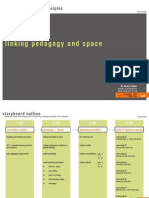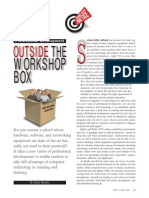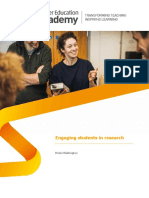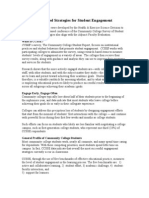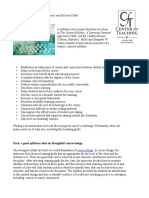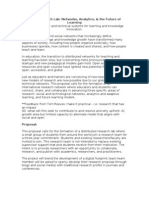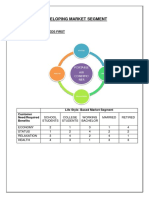Research Engaged Schools
Research Engaged Schools
Uploaded by
ECIS CommunicationsCopyright:
Available Formats
Research Engaged Schools
Research Engaged Schools
Uploaded by
ECIS CommunicationsOriginal Description:
Copyright
Available Formats
Share this document
Did you find this document useful?
Is this content inappropriate?
Copyright:
Available Formats
Research Engaged Schools
Research Engaged Schools
Uploaded by
ECIS CommunicationsCopyright:
Available Formats
Research Engaged Schools:
How your school can (and should) determine for itself what is right
Who should attend?
Administrators; researchers; program leaders; deans of curriculum & instruction, teaching & learning,
professional development, and/or assessment.
What you will learn:
The Research Engaged Schools interest group led a pre-conference at ECIS 2014 in which each of its
members shared the particular model our schools use to incorporate research into school life
(professional development, decision making, community building, etc.) We agreed at our annual
meeting that our ECIS 2014 session provided a good overview, but that future participants would
benefit more from an orientation that provided individual work time, with interest group members
serving as consultant-peers further along the learning curve, to construct individualized models that
are the right scope and emphasis for each individual school.
Therefore, the proposed schedule includes overview materials sent to participants in advance,
including suggested paths for the pre-conference depending on the current state of schools and their
perceived needs. A majority of time is dedicated to participants, so that they may work on a
framework for their school while the presenters are physically available to answer questions about
their own models and the on-going implementation of those models. It is, more more than less, a
flipped classroom.
Participants will finish the pre-conference with realistic school-based research models, recognizing
the constraints and opportunities of their own schools, based on the expertise of those of use who
have been fiddling with research in schools for several years.
How is the workshop linked to Designing on Purpose?
Schools that include teachers and staff in researching their own programs are less likely to adopt new
programs and/or new material resources based on the latest reform or educational trend. They are
also less likely to become, in the words of Michael Fullan (1997), Christmas Tree Schools, a term he
used for schools with lots of glitter but overall incoherent programs.
Schools informed by research Research Engaged Schools are more likely to base program and
material adoption, as well as professional development and school policy, on activities that add value
to the students educational experience. Research Engaged Schools form a base on which schools can
intentionally, with information collected locally, design on purpose, whether an initiative be
classroom-based, program-based, or school-wide.
Fullan, M. (1997) Whats Worth Fighting for in the Principalship? (2nd ed), Toronto,
Elementary Teachers Federation of Ontario; New York, Teachers College Press.
Research Based Schools Interest Group Facilitators
Paul Magnuson (chair) LAS, Switzerland
Latifa Hassanali, ACS, England
Mark Dilworth, ZIS, Switzerland
Rob Fens, Wolfert Borselen Group, Netherlands
and additional facilitators
Ben Hren, ACS, England
Christina Hinton, Harvard University, USA
The Research Based Schools (formerly Professional Learning and Action Research) Interest Group is in
its sixth year, first chaired by Chad and now by Paul. The members led a successful pre-conference at
ECIS 2014, with the invited guests Ben and Christina Following ECIS 2014, a majority of the group met
at LAS. In addition, Latifa and Ben have been working with Christine on the Research Schools
International program at Harvard. In other words, were a connected, highly functioning group with
multiple perspectives (and on-going leadership experience) using research for professional
development and continuous improvement.
Materials shared with registrants via website that outline the use of research in schools by ACS, LAS, Wolfert van
Borselen, and ZIS schools. Materials also will include a needs analysis (for school administrators to determine an
appropriate starting point and scope), log of questions to ask regarding on or more of the research-in-schools
models, guidance for an implementation timeline emphasizing sustainable change, and additional checklists to
prepare for the pre-conference.
Agenda outline:
Wednesday
Introductions of participants and facilitators
Elevator pitch introduction of school models
Office hours time for in-depth information exchange of one or more of the school models, starting with
questions participants generated when using pre-materials.
Individual school plan creation time
Check in / Feedback to the group from facilitators based on participant work so far
Questions and answers for the day
Participants leave copy of work (hard copy or other, as participants are comfortable) with facilitators for
commenting
Thursday
Short recap of Wednesday
Individual feedback sessions between participants and facilitators, based on Wednesdays work and
Wednesday evenings facilitator comments to work achieved so far
Individual school plan creation time
Check in / Feedback to the group from facilitators based on participant work so far
Individual school plan creation time with an eye toward presenting to other schools
Presentations as participants are comfortable
Wrap-up, next steps.
Post-conference
Follow up by email group with participants who choose to remain in touch, including linking to schools that get
programs up and running.
You might also like
- Tallis - What Neuroscience Cannot Tell Us About OurselvesNo ratings yetTallis - What Neuroscience Cannot Tell Us About Ourselves24 pages
- SAP S4HANA Technical Part 3 - Custom Code Management During S4HANA ConversionNo ratings yetSAP S4HANA Technical Part 3 - Custom Code Management During S4HANA Conversion7 pages
- Professional Development Activities For TeachersNo ratings yetProfessional Development Activities For Teachers6 pages
- What Is Teacher Professional Development?: Activities For Professional GrowthNo ratings yetWhat Is Teacher Professional Development?: Activities For Professional Growth10 pages
- Part 1 Motivation and Creative ThinkingNo ratings yetPart 1 Motivation and Creative Thinking102 pages
- Learning Centers Development and Operati-Min Splitted (BAB II)No ratings yetLearning Centers Development and Operati-Min Splitted (BAB II)12 pages
- Lesson 4 Principles of Curriculum For UnderstandingNo ratings yetLesson 4 Principles of Curriculum For Understanding4 pages
- EDLP 380: Instructional Leadership: Course Syllabus Overview Summer, 2011 June 27-July 1 8:30-4:30100% (1)EDLP 380: Instructional Leadership: Course Syllabus Overview Summer, 2011 June 27-July 1 8:30-4:306 pages
- Models, Approaches, Strategies and Methods of TeachingNo ratings yetModels, Approaches, Strategies and Methods of Teaching14 pages
- JISC Open Educational Resources Programme: Phase 2 OER I S: R RNo ratings yetJISC Open Educational Resources Programme: Phase 2 OER I S: R R100 pages
- Theory and Practice.: Prepared By: Irni Ismail MP111381No ratings yetTheory and Practice.: Prepared By: Irni Ismail MP11138133 pages
- Nebraska State College System Policy 4141: A. Instructor: B. Office0% (1)Nebraska State College System Policy 4141: A. Instructor: B. Office9 pages
- Walkington Engaging Students in ResearchNo ratings yetWalkington Engaging Students in Research7 pages
- S I R S: School Improvement Through Teacher Decision MakingNo ratings yetS I R S: School Improvement Through Teacher Decision Making7 pages
- University of Brighton PGCE Early Childhood 3-7No ratings yetUniversity of Brighton PGCE Early Childhood 3-78 pages
- Student Engagement Strategies For The Classroom100% (1)Student Engagement Strategies For The Classroom8 pages
- On Teaching Volume 21 Number 4 (Spring 2012)No ratings yetOn Teaching Volume 21 Number 4 (Spring 2012)8 pages
- By Jessica Riviere, Danielle Picard, and Richard Coble: Syllabus ConstructionNo ratings yetBy Jessica Riviere, Danielle Picard, and Richard Coble: Syllabus Construction5 pages
- Curriculum Implementation - Cecile B. VillaramaNo ratings yetCurriculum Implementation - Cecile B. Villarama44 pages
- Integrating Active Learning Approaches in Language LearningNo ratings yetIntegrating Active Learning Approaches in Language Learning5 pages
- Purpose: Communication Theoretical Facilitations LibrariesNo ratings yetPurpose: Communication Theoretical Facilitations Libraries4 pages
- Open Research Lab: Networks, Analytics, & The Future of LearningNo ratings yetOpen Research Lab: Networks, Analytics, & The Future of Learning8 pages
- Innovation Through Teacher Education ProgramsNo ratings yetInnovation Through Teacher Education Programs23 pages
- Faculty Development and Student Learning: Assessing the ConnectionsFrom EverandFaculty Development and Student Learning: Assessing the Connections4/5 (1)
- Curriculum Compacting: An Easy Start to Differentiating for High Potential StudentsFrom EverandCurriculum Compacting: An Easy Start to Differentiating for High Potential Students5/5 (1)
- Keynote Speakers What'S New This Year: Designing On PurposeNo ratings yetKeynote Speakers What'S New This Year: Designing On Purpose5 pages
- Teacher To Teacher - Reflective Peer ObservationNo ratings yetTeacher To Teacher - Reflective Peer Observation1 page
- RIBCOB - A Closer Look at Implementation ScienceNo ratings yetRIBCOB - A Closer Look at Implementation Science8 pages
- Worksheet - Reaching The Age of AdolescenceNo ratings yetWorksheet - Reaching The Age of Adolescence6 pages
- Daron@mit - Edu: Curriculum Vitae Daron AcemogluNo ratings yetDaron@mit - Edu: Curriculum Vitae Daron Acemoglu19 pages
- Sickle Cell Disease: Khoo Ser Chin Jasmine Tijana Jovanovic Mary Kathleen LillenessNo ratings yetSickle Cell Disease: Khoo Ser Chin Jasmine Tijana Jovanovic Mary Kathleen Lilleness15 pages
- [FREE PDF sample] Further Mathematics for Economic Analysis 2nd Edition Knut Sydsaeter ebooks100% (5)[FREE PDF sample] Further Mathematics for Economic Analysis 2nd Edition Knut Sydsaeter ebooks82 pages
- Safe Work Practices Safe Work Practices: Lock and Tag All SourcesNo ratings yetSafe Work Practices Safe Work Practices: Lock and Tag All Sources5 pages
- 396ce15005 PPT On Rain Water HarvestingNo ratings yet396ce15005 PPT On Rain Water Harvesting11 pages
- Fractals in Sound Patterns of Sanskrit Mantras and Its Use in Healing Therapy June 2022 7666551745 3607796No ratings yetFractals in Sound Patterns of Sanskrit Mantras and Its Use in Healing Therapy June 2022 7666551745 36077964 pages
- Keeping Track of All The Things A Splunk Enterprise Security Use Case and Content Management StoryNo ratings yetKeeping Track of All The Things A Splunk Enterprise Security Use Case and Content Management Story48 pages
- Labview Core 2 Instructor Guide: November 2014No ratings yetLabview Core 2 Instructor Guide: November 201453 pages
- D. J. Sanghvi College of Engineering, Mumbai-56No ratings yetD. J. Sanghvi College of Engineering, Mumbai-564 pages
- Research On The Crash Safety of The Car Bumper Base On The Different StandardsNo ratings yetResearch On The Crash Safety of The Car Bumper Base On The Different Standards8 pages



